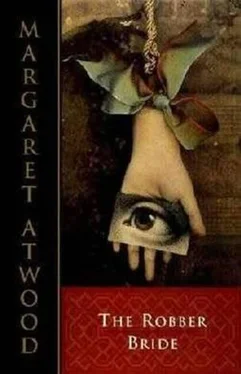The Robber Bride
Margaret Atwood
1993
Margaret Atwood was born in Ottawa in 1939 and spent much of her early life in northern Ontario and Quebec. She is Canada’s most eminent novelist and poet and has published more than thirty books of fiction, poetry and critical essays. Her novels include The Handmaid’s Tale, Cat’s Eye and Alias Grace, all of which were shortlisted for the Booker Prize and The Blind Assassin, which won the 2000 Booker Prize. Her work has been translated into thirty-three languages and she is the recipient of many literary awards and honours, including the Sunday Times Author of the Year in 1993 and the Arthur C. Clarke Award for Science Fiction.
Margaret Atwood lives in Toronto with the writer Graeme Gibson.
A rattlesnake that doesn’t bite teaches you nothing.
—Jessamyn West
Only what is entirely lost demands to be endlessly named: there is a mania to call the lost thing until it returns.
—Günter Grass
Illusion is the first of all pleasures.
—Oscar Wilde
I would like to thank the following for their help: my agents Phoebe Larmore and Vivienne Schuster; my editors Ellen Seligman, Nan A. Talese, and Liz Calder; David Kimmel, for helping with some of the historical details; Barbara Czarnecki, Judi Levita, Marly Rusoff Sarah Beale, and Claudia Hill-Norton; Joan Sheppard, Donya Peroff, and Sarah Cooper; Michael Bradley, Garry Foster, Kathy Minialoff; Gene Goldberg, and Alison Parker; Rose Tornato. Thanks also to Charles and Julie Woodsworth, to Dorris Heffron, and to John and Christine O’Keefle, for premises rendered.
John Keegan’s The Face of Battle and The Mask of Command were most useful for background, as were None Is Too Many by Irving Abella and Harold Troper and The War Against the Jews , by Lucy S. Dawidowicz; and also for specific battles and events, Richard Erdoes’s A.D. 1000 and The Unknown South of France by Henry and Margaret Reuss. The assassination of ballistics expert Gerald Bull is dealt with in Bull’s Eye , by James Adams, and in Wilderness of Mirrors , by Dale Grant.
The image of the body as a lampshade is courtesy Lenore Mendelson Atwood; the expression “brain snot” is courtesy E J.A. Gibson. The red-and-white footprints recall a story told to me by Earle Birney; the toboggan incident and the black-painted apartment from Graeme Gibson; the ghost as dry rice was suggested by an episode recounted by P K. Page; the notion of a flesh dress came from James Reaney’s poem “Doomsday, or the Red-Headed Woodpecker”; the tale of the heroic German aunt was suggested partly by Thomas Karl Maria Schwarz; and the professor who disallowed military essay topics for women from an anecdote related by Susan Crean.
Zenia is pronounced with a long e, as in seen; Charis with a hard c as in karma. The Teutones (second century B.C.) are distinct from the Teutons (tenth century A.D.).
For Graeme and Jess, and for Ruth, Phoebe, Rosie, and Anna
And Absent Friends
The story of Zenia ought to begin when Zenia began. It must have been someplace long ago and distant in space, thinks Tony; someplace bruised, and very tangled. A European print, hand-tinted, ochre-coloured, with dusty sunlight and a lot of bushes in it—bushes with thick leaves and ancient twisted roots, behind which, out of sight in the undergrowth and hinted at only by a boot protruding, or a slack hand, something ordinary but horrifying is taking place.
Or this is the impression Tony has been left with. But so much has been erased, so much has been bandaged over, so much deliberately snarled, that Tony isn’t sure any longer which of Zenia’s accounts of herself was true. She can hardly ask now and even if she could, Zenia wouldn’t answer. Or she would he. She would lie earnestly, with a catch in her voice, a quaver of suppressed grief, or she would he haltingly, as if confessing; or she would lie with a cool, defiant anger, and Tony would believe her. She has before.
Pick any strand and snip, and history comes unravelled. This is how Tony begins one of her more convoluted lectures, the one on the dynamics of spontaneous massacres. The metaphor is of weaving or else of knitting, and of sewing scissors. She likes using it: she likes the faint shock on the faces of her listeners. It’s the mix of domestic image and mass bloodshed that does it to them; a mix that would have been appreciated by Zenia, who enjoyed such turbulence, such violent contradictions. More than enjoyed: created. Why is still unclear.
Tony doesn’t know why she feels compelled to know. Who cares why, at this distance? A disaster is a disaster; those hurt by it remain hurt, those killed remain killed, the rubble remains rubble. Talk of causes is beside the point. Zenia was a bad business, and should be left alone. Why try to decode her motives?
But Zenia is also a puzzle, a knot: if Tony could just find a loose end and pull, a great deal would come free, for everyone involved, and for herself as well. Or this is her hope. She has a historian’s belief in the salutary power of explanations.
Where to start is the problem, because nothing begins when it begins and nothing’s over when it’s over, and everything needs a preface: a preface, a postscript, a chart of simultaneous events. History is a construct, she tells her students. Any point of entry is possible and all choices are arbitrary. Still, there are definitive moments, moments we use as references, because they break our sense of continuity, they change the direction of time. We can look at these events and we can say that after them things were never the same again. They provide beginnings for us, and endings too. Births and deaths, for instance, and marriages. And wars.
It’s the wars that interest Tony, despite her lace-edged collars. She likes clear outcomes.
So did Zenia, or so Tony thought once. Now, she can hardly tell.
An arbitrary choice then, a definitive moment: October 23, 1990. It’s a bright clear day, unseasonably warm. It’s a Tuesday. The Soviet bloc is crumbling, the old maps are dissolving, the Eastern tribes are on the move again across the shifting borders. There’s trouble in the Gulf, the real estate market is crashing, and a large hole has developed in the ozone layer. The sun moves into Scorpio, Tony has lunch at the Toxique with her two friends Roz and Charis, a slight breeze blows in over Lake Ontario, and Zenia returns from the dead.
Tony gets up at six-thirty, as she always does. West sleeps on, groaning a little. Probably in his dreams he’s shouting; sounds in dreams are always louder. Tony inspects his sleeping face, his angular jaw-line relaxed to softness, his unearthly blue hermit’s eyes so gently closed. She’s happy he’s still alive: women live longer than men and men have weak hearts, sometimes they just keel over, and although she and West aren’t old—they’re hardly old at all—still, women her age have awakened in the morning to find dead men beside them. Tony does not consider this a morbid thought.
She’s happy in a more general way, too. She’s happy that West is on this earth at all, and in this house, and that he goes to sleep every night beside her and not somewhere else. Despite everything, despite Zenia; he’s still here. It seems a miracle really. Some days she can’t get over it.
Quietly, so as not to wake him, she gropes for her glasses on the night-table, then slides down out of the bed. She pulls on her Viyella dressing gown and her cotton socks and her grey wool work socks over them, and stuffs her bundled feet into her slippers. She suffers from cold feet, a sign of low blood pressure. The slippers are in the form of raccoons, and were given to her by Roz, many years ago, for reasons best known to Roz. They’re the duplicates of the slippers Roz gave her eight-year-old twins at the time; they’re even the same foot size. The raccoons are somewhat ratty by now and one of them is missing an eye, but Tony has never been good at throwing things out.
Читать дальше












